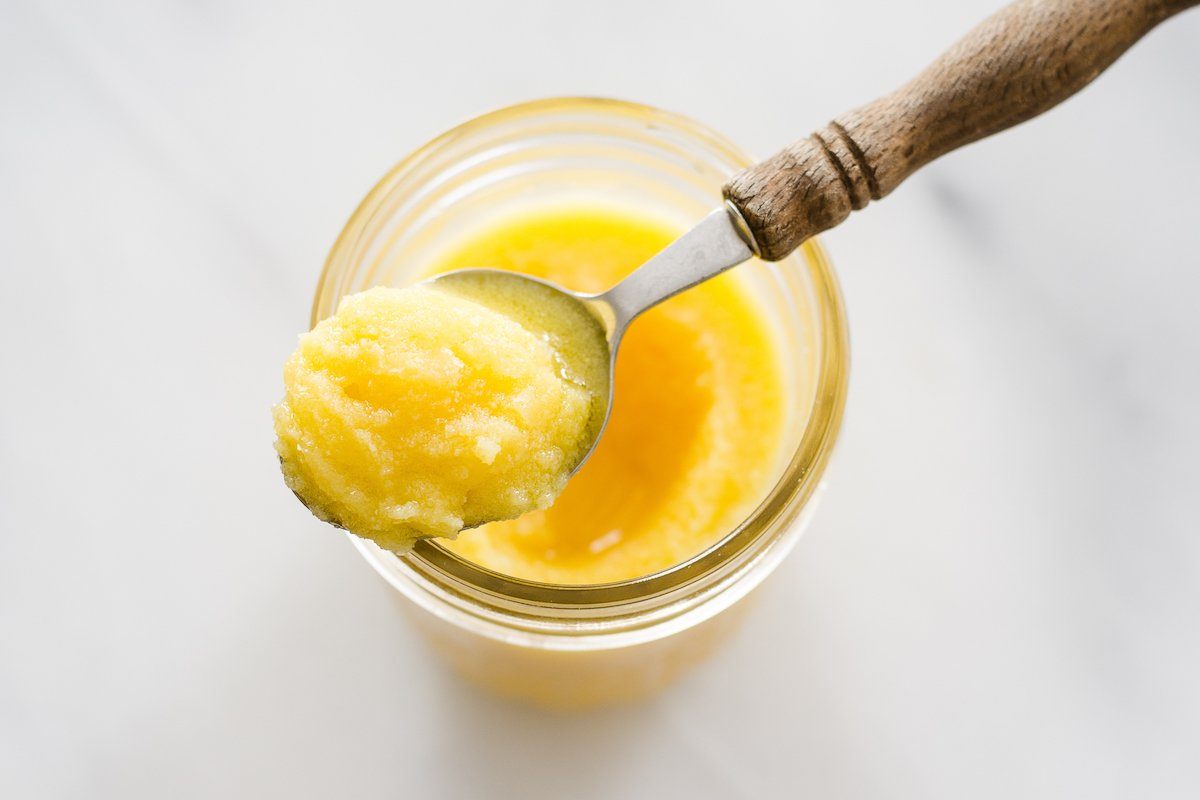
- Unknown
Ghee:
Gut Health, Heart Health, Bone Health, Inflammation
If you’re new to ghee, here’s the scoop: there’s a lot to love about this buttery spread.
What is Ghee?
Ghee is a type of clarified butter that originated in India. It’s been a prized ingredient in Ayurvedic medicine for thousands of years, and is a popular cooking oil in South Asian cultures. It’s made by simmering butter — ideally grass-fed butter — over low heat until the water has evaporated and the milk solids have separated. What you’re left with is a rich and creamy pure butter fat, aka Liquid Gold. The only difference between ghee and standard clarified butter is that ghee is cooked down further, giving it a nuttier flavour and aroma.

(Photo from Hello Glow)
The Benefits of Ghee for Cooking
One of the reasons we love ghee is because the milk solids from the butter are separated and removed, making it lactose and casein-free and therefore easier to digest for those who are sensitive to dairy. That said, as a dairy-based food, ghee should be avoided by those who are allergic to dairy.
Ghee also has a high smoking point, which means that it can be heated to a high temperature without burning. This is important as heating a fat past its burning point breaks down its nutrients and causes it to oxidize and form free radical cell damage in the body. Ghee’s high smoking point makes it a versatile cooking oil, especially for high-heat cooking such as roasting and pan-frying.

(Photo from Against All Grain)
The Health Benefits of Ghee
Although the consumption of healthy fats seems like a relatively new trend with the popularity of the ketogenic diet, ghee has known what’s up for thousands of years. This fat, made up of short and medium-chain fatty acids, boasts a number of health benefits, including:
Source of fat-soluble vitamins
Ghee is a great way to get some key fat-soluble vitamins in your diet, as it’s a source of vitamin A (immunity, bone health, vision), vitamin D (numerous benefits, including immunity, bone health & metabolism), vitamin E (antioxidant) and vitamin K (bone & heart health).
Gut Health
Ghee contains butyric acid (butyrate), a short-chain fatty acid that plays a key role in gut health. It’s been shown to have anti-inflammatory properties (1), helping to reduce inflammation in the gut and throughout the body. It also supports the health of cells in the lining of the small and large intestine, and is the primary source of energy for the cells in your colon (2), promoting integrity of the gut and helping to prevent conditions such as leaky gut.
Immunity
Butyrate helps to promote a healthy gut microbiome, and since a huge part of our immune system is in our gut (3), consuming ghee can help support immunity.
Supports Weight Loss
The medium-chain fatty acids in ghee (like those found in coconut oil) have been shown to help the body burn fat and in turn, decrease body weight and waist and hip circumference, as compared to long-chain triglycerides (4).

(Photo from The Toasted Pine Nut)
Choosing the Best Ghee
Now, it’s important to distinguish between different types of ghee. Ideally, you want to use grass-fed, organic ghee (if you’re having trouble finding grass-fed, be sure that it’s at least organic). This will ensure a higher amount of nutrients and no pesticide residue from cows’ feed.
Also, be aware that there’s an increasing prevalence of ghee made from vegetable oil, known as vanaspati ghee. Unlike dairy ghee, vanaspati ghee is high in trans fats which has been linked to an increased risk of cardiovascular disease because it increases the ratio of LDL (“bad”) cholesterol to HDL (“good”) cholesterol (5).
Make sure you’re buying high-quality grass-fed ghee or organic dairy ghee, or try making your own ghee at home!

(Photo from The JOYÀ Life)
How To Use
Use ghee as a buttery spread, or get creative and add it to your favourite cooking and baking recipes in place of butter or oil! Use it on roasted vegetables like carrots and mushrooms, or to make a savoury-sweet dipping sauce, and whip it up to create a fluffy butter.
Ghee is also a game-changer in desserts. It’s the star in next level velvety caramel, and when it comes to baking, the options are endless! Use it to make buttery shortbread, healthy brownies, and even graham crackers (hello s’mores!)
